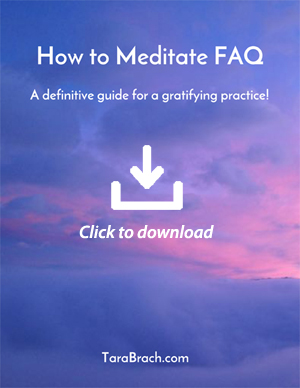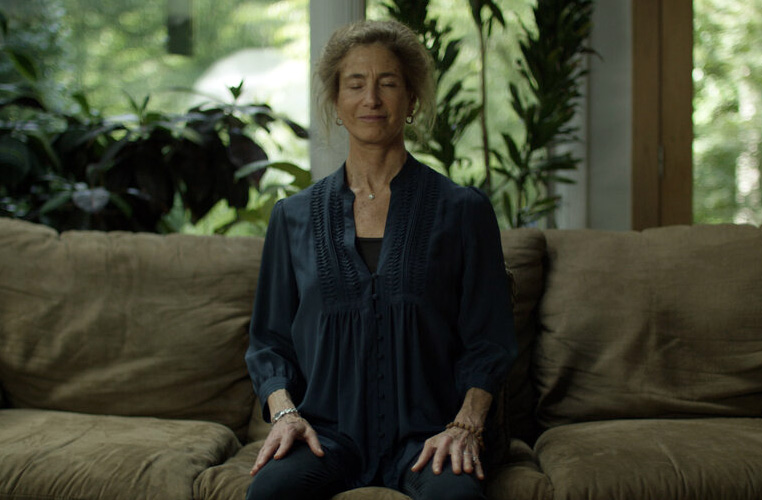The RAIN of Self-Compassion
- View or download the PDF version
- Link to talk: The RAIN of Self-Compassion
- Link to Meditation: The RAIN of Self-Compassion
Translations:
- تأمل مطر من الرحمة الذاتية (Arabic)
- RAIN de la Auto-Compasión – PDF ~ and (blog En Español)
- RAIN: un exercice d’auto-compassion – PDF (Français)
- „RAIN“ des Mitgefühls für uns selbst des PDFs (Deutche)
- RAIN: Medfølelse med sig selv – PDF (Dansk)
- De RAIN van zelfcompassie – PDF (Dutch)
- 자기자비의 RAIN – PDF (한국어) – PDF (Korean)
More Resources on RAIN: Recognize, Allow, Investigate, Nurture
When I was in college, I went off to the mountains for a weekend of hiking with an older, wiser friend of twenty-two. After setting up our tent, we sat by a stream, watching the water swirl around rocks, talking about our lives. At one point she described how she was learning to be “her own best friend.” A wave of sadness came over me, and I broke down sobbing. I was the furthest thing from my own best friend. I was continually harassed by an inner judge who was merciless, nit-picking, demanding and always on the job. My guiding assumption was, “Something is fundamentally wrong with me,” as I struggled to control and fix what felt like a basically flawed self.
Over the last several decades, through my work with tens of thousands of clients and meditation students, I’ve come to see the sense of personal deficiency as epidemic. When we feel unworthy we are in a trance that causes tremendous suffering. Yet, I have found in my own life and with countless others that we can awaken from this trance through mindful self-compassion. We can come to trust the goodness and purity of our hearts.
In order to unfold, self-compassion depends on honest, direct contact with our own vulnerability. This compassion fully blossoms when we actively offer care to ourselves. Yet when we’ve gotten stuck in the trance of unworthiness, it often feels impossible to arouse self-compassion. To help people address feelings of insecurity and unworthiness, I like to share a meditation I call the RAIN of Self-Compassion.
The acronym RAIN is an easy-to-remember tool for practicing mindfulness and compassion using the following four steps:
Recognize what is going on;
Allow the experience to be there, just as it is;
Investigate with interest and care;
Nurture with self-compassion.
You can take your time and explore RAIN as a stand-alone meditation or move through the steps whenever challenging feelings arise.

R—Recognize What’s Going On
Recognizing means consciously acknowledging, in any given moment, the thoughts, feelings, and behaviors that are affecting us. Like awakening from a dream, the first step out of the trance of unworthiness is simply to recognize that we are stuck and subject to painfully constricting beliefs, emotions, and physical sensations. Common signs of the trance include a critical inner voice, feelings of shame or fear, the squeeze of anxiety or the weight of depression in the body. Recognizing can be a simple mental whisper, noting what has come up.
A—Allow the Experience to be There, Just as It Is
Allowing means letting the thoughts, emotions, feelings, or sensations we have recognized simply be there, without trying to fix or avoid anything. When we’re caught in self-judgment, letting it be there doesn’t mean we agree with our conviction that we’re unworthy. Rather, we honestly acknowledge the arising of our judgment, as well as the painful feelings underneath.
Many students I work with support their resolve to pause and let be by silently offering an encouraging word or phrase to themselves. For instance, you might feel the grip of fear and mentally whisper, Yes, or It’s ok, in order to acknowledge and accept the reality of your experience in this moment.
I—Investigate with Interest and Care
Once we have recognized and allowed what is arising, we can deepen our attention through investigation. To investigate, call on your natural curiosity – the desire to know truth – and direct a more focused attention to your present experience. You might ask yourself: What most wants attention? How am I experiencing this in my body? What am I believing? What does this vulnerable place want from me? What does it most need? Whatever the inquiry, your investigation will be most transformational if you step away from conceptualizing and bring your primary attention to the felt-sense in the body.
When investigating, it is essential to approach your experience in a non-judgmental and kind way. This attitude of care helps create a sufficient sense of safety, making it possible to honestly connect with our hurts, fears and shame.
N—Nurture with Self-Compassion
Self-compassion begins to naturally arise in the moments that we recognize we are suffering. It comes into fullness as we intentionally nurture our inner life with self-care. To do this, try to sense what the wounded, frightened or hurting place inside you most needs, and then offer some gesture of active care that might address this need. Does it need a message of reassurance? Of forgiveness? Of companionship? Of love? Experiment and see which intentional gesture of kindness most helps to comfort, soften or open your heart. It might be the mental whisper, I’m here with you. I’m sorry, and I love you. I love you, and I’m listening. It’s not your fault. Trust in your goodness.
In addition to a whispered message of care, many people find healing by gently placing a hand on the heart or cheek; or by envisioning being bathed in or embraced by warm, radiant light. If it feels difficult to offer yourself love, bring to mind a loving being – spiritual figure, family member, friend or pet – and imagine that being’s love and wisdom flowing into you.
When the intention to awaken self-compassion is sincere, the smallest gesture of turning towards love, of offering love – even if initially it feels awkward – will nourish your heart.
After the RAIN
When you’ve completed the active steps of RAIN, it’s important to just notice your own presence and rest in that wakeful, tender space of awareness. The fruit of RAIN is realizing that you are no longer imprisoned in the trance of unworthiness, or in any limiting sense of self. In other versions of RAIN, this is the N – not-identified. Give yourself the gift of becoming familiar with the truth and natural freedom of your being; it is mysterious and precious!
In clearly seeing my own suffering, my heart softened with care. I was now able to offer inwardly the nourishment of self-compassion. I gently put my hand over my heart—a gesture of kindness—and invited whatever other feelings were there to surface. A swell of fear (uncertainty for my future) spread through my chest, followed by an upwelling of grief at losing my health. The sense of self-compassion unfurled fully as I mentally whispered, “It’s all right, sweetheart,” and offered care to the depths of my vulnerability just as I would to a dear friend.
Over the next few minutes, the self-compassion widened into a vast sense of tender presence. I was no longer caught in a sense of self-aversion or in being a victim of illness. This was the aftermath of a healing RAIN and I rested in the freedom of natural, loving awareness. I was at peace with the changing waves of physical and emotional experience moving through me.
The RAIN of Self-Compassion is not a one-shot meditation. Rather, as you practice you may experience a partial shift, perhaps a more subtle sense of warmth and openness, a widening in perspective, a quieting of mental stories, a softening of your heart. You can trust this! RAIN is a practice for life—a way of transforming doubts and fears with a healing presence. Each time you are willing to slow down and recognize, “Oh, this is the trance of unworthiness… this is fear… this is hurt…this is judgment…,” you are poised to de-condition the old habits and limiting self-beliefs that confine your heart. Gradually, more than any story you’ve ever told yourself about being “not good enough” or “basically flawed,” you’ll experience natural loving awareness as the truth of who you are.
Article adapted from True Refuge (2013) by Tara Brach.
Paperback edition now available… link to order below:
True Refuge: Finding Peace and Freedom in Your Own Awakened Heart


